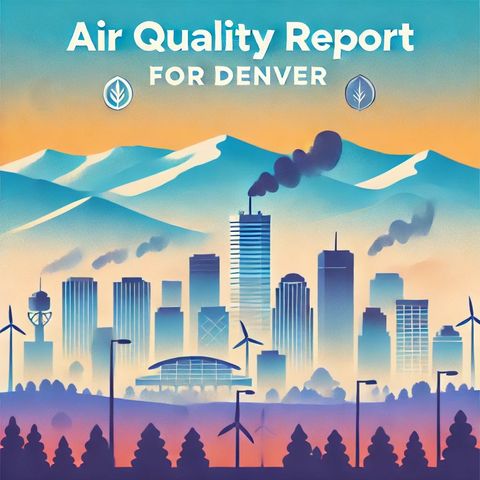Denver's Air Quality Concerns: Moderate Levels with Pollutant Challenges

Download and listen anywhere
Download your favorite episodes and enjoy them, wherever you are! Sign up or log in now to access offline listening.
Denver's Air Quality Concerns: Moderate Levels with Pollutant Challenges
This is an automatically generated transcript. Please note that complete accuracy is not guaranteed.
Description
Denver, situated at the base of the Rocky Mountains, is known for its picturesque landscapes and outdoor activities. However, air quality can be a concern due to a combination of...
show moreAs of this morning, Denver's AQI is categorized as "Moderate," which means the air quality is acceptable; however, for some pollutants, there may be a moderate health concern for a very small number of people who are unusually sensitive to air pollution. The primary pollutants affecting Denver's air quality today are ground-level ozone, particulate matter (PM2.5 and PM10), and nitrogen dioxide (NO2).
Ground-level ozone is formed when pollutants emitted by cars, power plants, industrial boilers, refineries, and other sources chemically react in the presence of sunlight. Denver's high elevation and sunny climate contribute to the formation of ozone, especially in the warmer months. Ozone at ground level is a harmful air pollutant, as opposed to the ozone layer high in the atmosphere which protects us from the sun's ultraviolet rays.
Particulate matter, both PM2.5 and PM10, is another concern. PM2.5 refers to fine inhalable particles, with diameters that are 2.5 micrometers and smaller. PM10 are inhalable particles, with diameters generally 10 micrometers and smaller. These particles come from a variety of sources including motor vehicles, industrial processes, and even wildfires. PM2.5 is particularly worrisome because it can penetrate deep into the lungs and enter the bloodstream, causing various health issues such as respiratory and cardiovascular problems.
Nitrogen dioxide is another pollutant of concern, primarily emitted from motor vehicles and industrial facilities. Short-term exposure to elevated levels of NO2 can aggravate respiratory diseases, particularly asthma, and can lead to increased emergency room visits and hospital admissions.
Weather conditions, such as temperature and wind, play a significant role in the daily variation of air quality. Today, Denver is experiencing mild temperatures with light winds, which may contribute to slightly higher concentrations of these pollutants as they do not disperse as easily.
It's important for Denver residents, particularly those with pre-existing health conditions like asthma or heart disease, as well as children and the elderly, to stay informed about air quality conditions. On days when the AQI is higher, limiting outdoor exertion can minimize adverse health effects.
Local authorities and environmental agencies continue to monitor air quality and implement measures to reduce pollution levels. Initiatives such as promoting the use of public transportation, encouraging carpooling, and improving industrial emission standards are ongoing efforts to address air quality concerns in the Denver area.
In conclusion, while Denver enjoys many days of good air quality, it is crucial to stay informed and take necessary precautions on days when pollution levels rise. The health and well-being of Denver's residents depend on continued vigilance and proactive measures to improve air quality.
Information
| Author | QP-5 |
| Organization | William Corbin |
| Website | - |
| Tags |
Copyright 2024 - Spreaker Inc. an iHeartMedia Company
